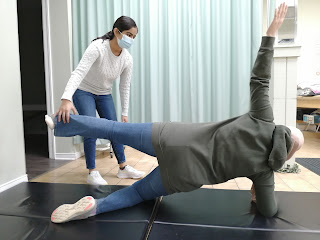How Exercise Impacts Sleep and Vice Versa
Getting enough sleep is incredibly important for
our health and insufficient sleep is associated as a risk factor for type 2 diabetes, several cardiovascular
diseases, obesity, poor mental health, depression, and accidents. Additionally, in general, getting 7-8 hours of sleep (for adults) is correlated with lower mortality and prevalence of disease (morbidity). Studies suggest
that good sleep habits and moderate physical activity can benefit each other in a reciprocal relationship.
However, about 1 in 4 Canadian adults between the ages of 18-79 years are not getting sufficient sleep (1 in 3
in adults aged 35 to 64 years). Poor sleep quality is also
an issue in the Canadian population with about 50% of adults having difficulty
going to sleep or staying asleep and 1 in 5 adults report their sleep isn’t
refreshing. These aspects are negatively
affecting the stress levels and mental health of Canadians. Among adults that report getting inadequate
sleep, 36.3% have chronic stress compared to 23.2% of adults with sufficient
sleep. Similarly, 12.3% of adults that get inadequate amounts of sleep report
they have poor mental health compared to 5.8% of adults getting sufficient
sleep.
While we know sleep is an important physiological
process, what many don’t realize is that regular moderate-intensity exercise can help improve and maintain sleep quality. As mentioned in the previous blog, exercise has a
myriad of health benefits. This is particularly true for people with
cardiovascular diseases or who experience prolonged bed rest. In oncology, exercise can help cancer patients with their
response to treatments, their postoperative recovery time, symptom management, self-esteem, and more. It has also been found to help
with patients’ sleep. Individuals with cancer often experience frequent sleep
disturbances and poorer quality of sleep. Cancer patients that were more
physically active experience less of these disturbances and better
self-reported sleep quality.
Another population that often experiences sleep
disturbances is older adults. Aging is associated with the disruption of the individual’s normal circadian rhythm and sleep patterns. In this population as well, it has been found that
incorporating scheduled exercise improves their quality of sleep. This is important because insufficient sleep is
associated with many neurodegenerative diseases such as Alzheimer’s disease, for example.
The risk of these diseases increases with age so incorporating regular exercise
(which has other health benefits as well) can help improve sleep quality and
help mitigate the risk of developing neurodegenerative diseases.
Sleep has been well documented to improve cognition
and memory. This is true even in younger populations. Good sleep is associated with higher college GPAs, lower risk of academic failure, better retention of information, and some studies
found that getting a good night’s sleep the night before an exam leads to better test results than
staying up late to cram.
So, while it seems to be well established that sleep contributes significantly to our overall well-being and that exercise can help improve and maintain our sleep quality, what kind of exercise is recommended? Most of the research has been done using moderate aerobic activity or even light aerobic activity like walking. However, there are many benefits to incorporating resistance training into your regular routine like promoting muscle strength and preventing muscle loss (hypertrophy), reducing the risk of diseases like osteoporosis, improving mobility and range of motion, and overall it can improve independence and quality of life in older age. The Canadian 24-hour Movement guidelines, discussed in the previous blog post, have recommendations for physical activity, sleep, sedentary behaviour, screen time, and more. If you need help getting started in becoming regularly active or finding a program that meets your individualized needs, you can always consult a professional, like a physiotherapist.
The Canadian Society for Exercise Physiology (CSEP)
recommends the following guidelines for nightly, good-quality sleep for each age
group:
·
0-3
months: 14 to 17 hours
·
4-11
months: 12 to 16 hours (including good quality naps)
·
1-2
years: 11-14 hours (including good quality naps), with consistent wake-up times
and bedtimes
·
3-4
years: 10-13 hours (including good quality naps), with consistent wake-up times
and bedtimes
·
5-13
years: 9-11 hours, with consistent wake-up times and bedtimes
·
14-17
years: 9-10 hours, with consistent wake-up times and bedtimes
·
18-64
years: 7-9 hours, with consistent wake-up times and bedtimes
·
65+
years: 7-8 hours, with consistent wake-up times and bedtimes
General
recommendations for better quality sleep:
·
Go to
bed at a regular, consistent time
·
Reduce
noise and distractions where you sleep
·
Avoid blue light (like phone and TV screen) at least 2 hours
before bed
·
Exercise
regularly
·
Engage
in activities to manage and reduce your stress like mindfulness-based
techniques
·
Avoid nicotine and
alcohol at least 4 hours before bed
·
Avoid consuming
caffeine 6 hours before
bed
·
Avoid daily
marijuana use for fewer sleep
disturbances
·
Restrict
your naps to 30 minutes and avoid napping in the evening
· Review your medications with your physician or pharmacist as some can impact sleep




Comments
Post a Comment